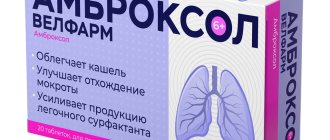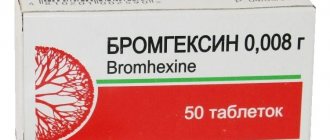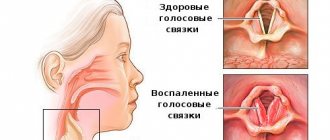Coughing is an innate human reflex, and not just a respiratory symptom of the disease. When a person coughs, he cleanses his respiratory tract from foreign bodies that interfere with breathing - food, dust, and when he gets sick - from sputum, mucus, blood, pus. If the cough does not stop for more than two months, the condition is usually called chronic. After eight weeks of chronic cough, you should definitely consult a doctor for examination, since this condition can be an indicator of many serious diseases.
Comparison criterion 1 - quality and quantity of sputum
Dry (non-productive) cough
It is not accompanied by sputum production and does not bring relief.
This cough can be a symptom of the following diseases:
- pharyngitis,
- laryngitis,
- "lecturer's" laryngitis,
- tracheitis,
- bronchitis.
Sometimes, depending on how a dry cough sounds, you can determine which disease it is a symptom of. In the case of the diseases mentioned above, the doctor may prescribe the use of a syrup that can transform a dry cough into a wet one. A not too intrusive dry cough caused by drying out of the pharyngeal mucosa or accumulation of mucus at the entrance to the larynx most likely indicates a disease such as pharyngitis. With this, the doctor may prescribe inhalations, warm drinks and lozenges and lozenges to soothe a sore throat.
Wet (productive) cough
Accompanied by sputum production. This is a viscous liquid that is produced by the mucous membranes of the respiratory tract: lungs, bronchi, throat, nasopharynx. Microbes and their metabolic products are removed from the human body with sputum.
- Yellow discharge can be a symptom of sinusitis, bronchitis or pneumonia. Sometimes a yellow tint is given by pus, which is mixed with sputum.
- White, curd-like sputum may indicate fungal diseases in the respiratory tract.
- Sputum that is white but watery in appearance indicates a viral infection or chronic respiratory disease.
- Brown discharge is a symptom of viral or bacterial diseases accompanied by inflammation. It can appear with pneumonia, bronchitis and even with a common cold.
To cure a wet cough, it is necessary to remove accumulated phlegm from the lungs and bronchi. In this case, doctors prescribe expectorant or sputum-thinning syrups and tinctures for adults.
It is important to know!
It is contraindicated to treat a wet (productive) cough with antitussive drugs, that is, those that suppress the cough reflex.
How to distinguish a dry cough from a wet one
Cough is one of the most common symptoms1, accompanying more than 50 diseases2. It can be dry or wet2, and the type of cough you are dealing with greatly determines the treatment1,2.
The most important difference is the presence of sputum. If it is present, then the cough is wet (productive); if not, it is dry (unproductive) 2.4.
You can see the remaining differences in the table.
| Features of cough | Dry | Wet |
| Volume | Loud1 | Medium volume4 |
| Character | Intrusive4, rude2, barking2, whistling,4 | Deep, chest, 16 |
| Hoarseness4 | Characteristic | Not typical |
| Duration of a cough attack | Most often short-lived, but can be long-term and debilitating3,4 | Typically, sputum is released after 2-3 coughs4. |
to come back to the beginning
Comparison criterion 2 - cough character
Paroxysmal cough
most often occurs in the first days of illness, becoming more active in the evening and at night.
The attacks follow one after another, there is no way to clear the throat, and between these moments it can be difficult to take a breath. The cause of the problem is dry airways and lack of mucus. The throat becomes irritated and attacks occur again and again. A recurrent cough
can occur suddenly and persist for both short and long periods.
If you notice that you cough from time to time, but for quite some time, then you need to find the reason. It could be an allergy to animals, dust or flowers, sometimes even to the presence of a certain person or to a certain situation. This cough is usually called psychosomatic. A short or one-time cough
can occur when you inhale smoke or any other irritants or when pieces of food get into the respiratory tract.
Causes of cough
Cough function
is to cleanse and ensure the airway is clear for air flow.
Sensitive receptors are present throughout the respiratory tract: in the nose, sinuses, pharynx, larynx, trachea, bronchi, pleura, so coughing is possible when the mucous membrane is irritated at all levels of the respiratory tract. When receptors in the outer ear, pericardium, and diaphragm are stimulated, a reflex cough is possible.
Different diseases may differ in the characteristics of cough and its nature
,
timbre
,
volume
,
duration
,
daily dynamics
.
Comparison criterion 3 - cough timbre
Dry cough is called barking
, similar, as one might imagine, to the loud barking of a dog.
This situation is due to the fact that the sputum becomes viscous and is difficult or impossible to cough up. A hoarse or hoarse cough
with dull and whistling sounds indicates diseases such as laryngitis, tracheitis, bronchitis or pneumonia.
With laryngitis and tracheitis, the cough is accompanied by a hoarse voice, and with bronchitis and pneumonia - chest wheezing. A silent cough
may be associated with severe inflammation of the vocal cords. It sometimes occurs in patients with extreme malnutrition or heart failure.
Literature
- Orlova N.V. Cough in a review of modern recommendations. Medical advice. 2019; 6: 74-81. DOI: https://doi.org/10.21518/2079-701X-2019-6-74-81.
- Zaitsev A. A., Okovity S. V. Cough: from basics to pharmacotherapy. Consilium Medicum. 2020; 22 (11): 72–77. DOI: 10.26442/20751753.2020.11.200523
- Klimova E. A., Samoshkina E. S. Dry cough // Infectious diseases: news, opinions, training / No. 2. – 2013. – pp. 39–44
- Semiotics of respiratory diseases // Textbook/ Ivanovo Medical Academy - 2013
- Zaitsev A. A. Cough // Clinical gerontology/ No. 1-2. – 2015. – P. 3–12
- Dilyagin V. M. Cough: causes, differential diagnosis, choice of antitussive drug // RMZh / No. 24. – 2012. – P.1199–1202
- Zaitsev A. A. Cough: problems and solutions // Practical Pulmonology / No. 2. – 2022. – P.78–86
- Bunyatyan N. D., Uteshev D. B., Sviridenko A. V. Diagnosis and treatment of cough in the practice of a general practitioner // RMJ / VOLUME 18. - No. 18. - 2010. - P. 1145–1148
- Instructions for use of the drug Doctor Mom® syrup // Registration number P N015983/01// GRLS of the Russian Federation. – URL: https://grls.rosminzdrav.ru/Grls_View_v2.aspx?routingGuid=167a2755-08f0-45e5-a51a-001e8a7435e8&t=/(access date: 08/18/2021)
- I.N. Zakharova et al. Herbal cough syrup Doctor Mom in the complex therapy of acute respiratory infections in children. Consilium Medicum. Pediatrics 2004.
- Instructions for use of the drug Doctor Mom® lozenges // Registration number P N013064/01// GRLS of the Russian Federation. – URL: https://grls.rosminzdrav.ru/Grls_View_v2.aspx?routingGuid=ca539561-5b21-402b-97cf-b384aed3576b&t= //(access date: 08/18/2021)
- Among cough remedies registered in the Russian Federation
- E. V. Kulyakin, P. A. Zatoloka, S. A. Semenov Postnasal drip: etiology, clinical picture, diagnosis, treatment // Medical Journal / No. 1. — 2022. — pp. 10-18
- Gudkova T.I. Methods for improving the drainage function of the bronchi in diseases of the respiratory system // Nurse/ No. 1. - 2009. - pp. 29-30
- Achkasov E.E., Talambum E.A., Khorolskaya A.B. Therapeutic physical culture for respiratory diseases / M.: Triada - X, 2011. 100 p. /ISBN 978-5-8249-01165-8
- Guidelines for general practitioners (family doctors). Cough. Association of General Practitioners (Family Doctors) of the Russian Federation. 2015
Comparison criterion 4 - time of cough onset
Morning cough
occurs in chronic inflammatory diseases of the upper respiratory tract.
It is especially common for smokers. This type is caused by the accumulation of sputum during the night, which does not clear and provokes a cough in the morning. Evening or night cough
occurs due to the fact that a person lying down accumulates phlegm, which does not clear the throat for a long time during sleep. Moreover, sputum in a horizontal position can accumulate in the larynx, provoking attacks.
Survey
Diagnosis of the causes of a deep dry cough is usually carried out by a general practitioner or family doctor. According to indications, consultations with specialized specialists are prescribed. The primary examination is aimed at assessing the condition of the lower respiratory tract, which is most often affected by symptoms. The primary recommended examination methods are:
- X-ray studies
. Typically, fluorography or plain radiography of the lungs is performed as screening. X-ray diagnostics can detect inflammatory changes, malformations, signs of systemic processes, space-occupying formations in the mediastinum and chest. - Rapid diagnosis of tuberculosis
. It is prescribed for prolonged causeless cough, there is information about contacts with patients with tuberculosis infection, and the patient belongs to risk groups. A tuberculin test or molecular genetic test is indicated. - Serological studies
. Due to the absence or meager volume of expectorated sputum, microbiological culture is usually ineffective. Therefore, to exclude a possible infectious process, RIF, ELISA, and PCR diagnostics are more often performed.
A general blood test is performed to identify acute bacterial inflammation, in which the ESR increases, leukocytosis is noted, a shift in the leukocyte formula to the left, as well as allergic processes occurring with eosinophilia. At the next stages of diagnosis, additional pulmonary examination methods are often prescribed (bronchography, bronchoscopy, examination of external respiratory function, ultrasound of the pleura and mediastinum, tomography of organs located in the chest, etc.), and allergy tests.
Chest X-ray is used to detect pathological processes
Comparison criterion 5 – degree of cough exacerbation
Acute cough
usually lasts no more than three weeks.
The reasons can be varied, most often it is ARVI, that is, viral infections of the nose, nasopharynx and throat. If the cough is infectious, an important symptom is an increase in temperature. An acute cough can also accompany diseases such as bronchitis, allergies, pneumonia; it can occur due to something caught in the respiratory tract, due to dust and irritating gases. If the cough is of a cold nature, then at first it is dry, and then For several days it turns into a wet type, which is a sign of the beginning of recovery. A lingering cough
sometimes lasts for months and can become chronic.
It should seriously alert the patient, as it may indicate a serious illness. In such a situation, you should consult a doctor as soon as possible. Chronic cough
can last more than 3-8 weeks, which, as a rule, is very exhausting and debilitating. Sometimes, in the chronic form, the head begins to feel dizzy or hurt, and weakness occurs. The causes may be various diseases caused by infections, for example, bronchial asthma. Chronic cough often occurs in adults who actively smoke, so it is commonly called smoker's bronchitis. The best way to cure it is to quit smoking.
Which doctors should I contact about a cough?
To determine the causes of cough, diagnose the condition and treat it, you must consult a therapist or pediatrician. If your cough doesn't go away within a few weeks, make an appointment with a pulmonologist or gastroenterologist (if you have acid reflux or established GERD).
A cough that occurs due to a cold or flu usually goes away on its own. You need to drink as much fluid as possible and get plenty of rest; to relieve pain and reduce high fever, you can take paracetamol or ibuprofen (attention: you should not give aspirin to children to reduce fever, its use is associated with the development of Reye's syndrome).
The effectiveness of multi-ingredient over-the-counter cough and cold medications in relieving symptoms is questionable. Research shows that not only do they not improve the condition, but they may have potentially serious side effects. They may also contain paracetamol and may cause an overdose if you are already taking it. It is not recommended to give over-the-counter multi-ingredient cough and cold medicines to children under 12 years of age. Cough lozenges (for children over 4 years old) and honey (for children over 1 year old), humidification and ventilation of the room can alleviate the condition.
Author:
Amelicheva Alena Aleksandrovna medical editor
Child's cough
In children, the cause of cough can also be:
- whooping cough;
- measles;
- mouth breathing. If a child constantly has a stuffy nose and is used to breathing through his mouth, cold and dry air entering the respiratory tract that has not passed through the nasal sinuses can cause irritation of the mucous membrane and cough;
- entry of a foreign body into the respiratory tract. In this case, the cough begins suddenly, the child turns red and begins to choke. It is necessary to help the child cough up a foreign object, for which you should press his chest and stomach to a hard surface, tap between his shoulder blades, or hold him upside down and shake him, tapping on his back. If help fails, the child should be taken to the hospital immediately.
With temperature
Temperature is mainly defined as a sign of the body's fight against viruses and bacteria. Of course, it can manifest itself in people under other circumstances, but we are talking now about cough and its origin. Thus, an increase in temperature and a dry cough may indicate the presence of pneumonia or another viral disease. It is important to receive timely qualified help from a therapist, a referral to a doctor and a prescription for medications that can help and not aggravate the situation. You should not self-medicate, because such a symptom is a serious sign of a protracted illness, which can develop even more and be life-threatening.
If your dry cough does not go away , and your body temperature has risen to 38 or higher, then you can always call our center and have a doctor come to your home. We will carry out all the necessary procedures to identify pathology and help cope with the disease.
Treatment of dry cough
Treatment of dry cough at the ENT-Asthma clinic is mainly aimed at calming the cough center, when coughing prevents you from falling asleep at night and attacks last a very long time. Often, such symptoms of dry cough indicate laryngitis, tracheitis, pharyngitis, which are successfully treated in our clinic. Our specialist doctors eliminate the symptoms of dry cough, since coughing can greatly tire anyone, interfere with their sleep, irritate and upset them.
When treating a dry cough, our specialist doctors prescribe antitussive drugs that soothe the mucous membrane and bring significant relief to the patient . Treatment of dry cough in children involves making an accurate diagnosis and prescribing subsequent treatment, which, as a rule, takes some time while the body fights the viral infections that caused the dry cough.
To successfully treat a dry cough, it is first necessary to identify the causes of the disease. And there can be many reasons: viral infections, bronchitis, pneumonia, tuberculosis, oncology. A dry cough may be due to an enlarged thyroid gland. A dry cough can also be a consequence of taking various medications or allergies.








